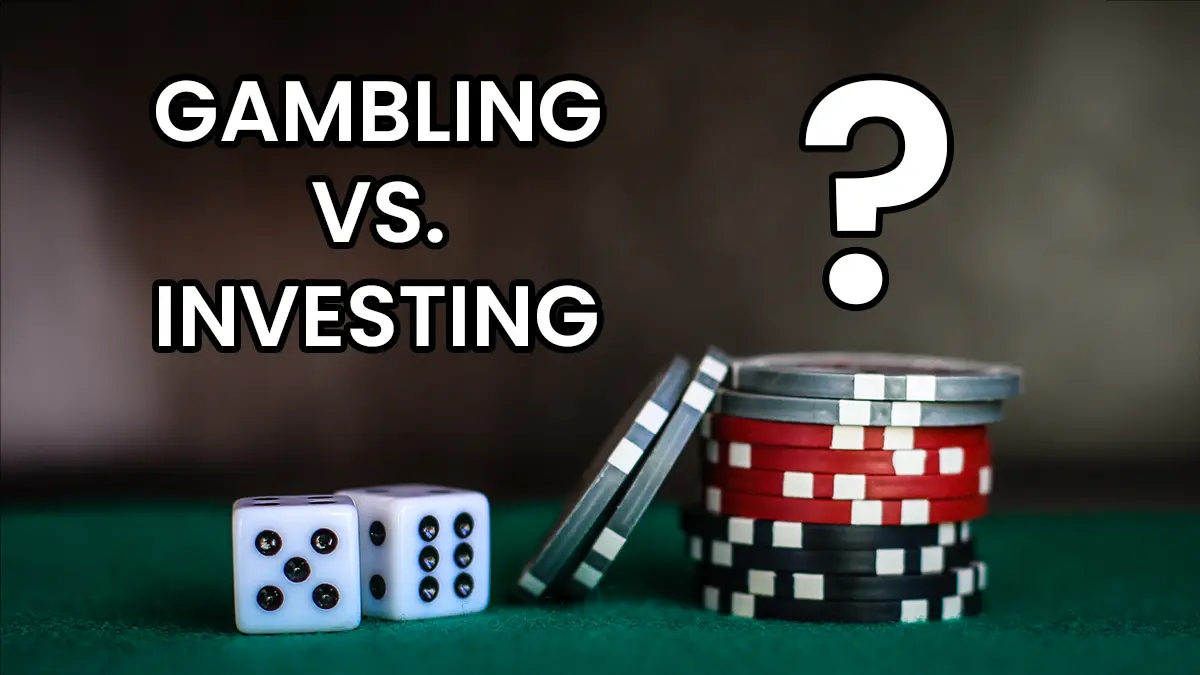Can investing be a form of gambling?
You might have heard people referred to investing as ‘middle-class’ or ‘posh’ gambling.
They say it’s just like betting on horses, but instead of $10 it’s $10,000 on a risky hunch. This certainly paints a picture – but is it true?
It is more of a gamble to not invest
A salient point here is that if you are not investing in the stock market, or any other asset class for that matter, that means you are simply holding cash. That cash is being eroded by inflation.
You may have it in a low interest savings account, but that will only minimize the impact. Over time, inflation can destroy your wealth.
At any point in history, if you took two people with $10,000 and one chose to invest it for 50 years, the other chose to hold it in cash, the investor wins every time. In fact, the investor could well be a millionaire due to the power of compound investing, unless they were extraordinarily unlucky with their entry point to the market. Meanwhile, the cash holder would have the buying power of perhaps just $1,000.
If you’re reading this, it’s likely that you have a pension and that this pension is invested in the market. If you’re not close to retirement age, not investing it in the market would be absurd, and any financial advisor would agree.
The vast majority of workers nowadays have a pension (due to government mandates in some countries) and their pensions are, whether the worker knows it or not, invested in the stock market.
It is a fundamental part of our society to invest. You could even argue that those who fear investing as gambling are the true gamblers. They are gambling that the single greatest wealth generating vehicle we have ever known will fail, leading to societal collapse and most likely the apocalypse. It’s a bold play.
Investing is a gamble, just like everything else
Investing in a globally diversified index fund is widely considered a prudent investment. On the stock market investing spectrum, this is about as far away from the ‘gambling side’ as you can get.
And yet it is still a ‘gamble’. For example, you are choosing to invest in stocks over other asset classes like real estate, which could perform better (but is equally a gamble!). The fund you choose may simply underperform other funds or asset classes.
The difference is, for an investor, your decision to invest in the index fund is (hopefully) based on reason, logic, research, history, and more. A spin at the roulette table is not.
So if investing is gambling to you, everything is gambling.
- Studying to be a copywriter is a ‘gamble’ in that your profession may not exist soon due to AI.
- Buying a house is a ‘gamble’ as the real estate market is at an all-time high.
On the spectrum of risk, index fund investing, studying at college, buying a house, are all (relatively speaking) much lower, more calculated risks than betting randomly at the roulette table.
You could therefore argue it is the amount of risk and the amount of reason that determines whether something is ‘a gamble’ or not.
But the investing odds are not in your favor
Can we judge whether something is gambling by the rate of success? Perhaps.
We say that investing is a calculated risk, but not all investing is created equally.
The latest S&P Indices Versus Active (SPIVA) report from S&P Dow Jones Indices suggests, on any given year, an international active investment fund has a roughly 50% chance of underperforming the S&P 500. This grows to 90% over a 20-year period:
| Time period | Percentage chance of beating S&P |
|---|---|
| 1 year | 50% |
| 3 years | 40% |
| 5 years | 30% |
| 20 years | 10% |
If only 10% of active fund managers can beat the average, your odds of picking a winning manager are extremely slim. 1 out of 10 is not something I’d be comfortable investing my life savings on.
These are long odds; you are taking a big multi-decade risk with this investing strategy. You could consider this an ill-advised gamble.
You would perhaps be better off with passive investing (matching the average market return).
Individual stock picking is risky
Whilst paying a professional appears to have a 9/10 chance of failure, DIY stock picking could be an even worse strategy.
The average investor had an annual return of just 2.9% in the first 20 years of this millennia, far below most benchmarks including the S&P 500 which had a 7.5% return.
Picking individual stocks gets you even closer to the mechanism you use when backing a horse. Instead of a handful of horses, you have a handful of companies that your entire financial future is riding on.
I think we can safely say that certain types of high-risk investing involve gambling.
Motivation for Gambling vs. Investing
Typically, gambling is done for excitement. As entertainment. A quick win.
Whilst certainly you can enjoy investing and it can be exciting to see your portfolio grow in value, it is a different type of excitement for the majority.
For the prudent investor, the motivation is financial security and long-term wealth. They are not looking for a short-term rush, but long-term security.
Rarely is a gambler placing his bets thinking about how much this will allow him to spend in retirement, leave to kids, or other pillars in financial planning. They are thinking about the prize.
Unless they are playing the lotto with a huge jackpot, they are unlikely to be gambling on something that will completely secure their financial future.
An investor’s motivation might well be fear. They save & invest out of fear of losing their job. Fear of having a meager retirement. Fear of losing their wealth.
On the contrary, while it is possible for a gambler to be motivated by fear, this is rarely the case. Quite the opposite in fact; they are operating in the pleasure center of the brain.
You can indeed tap into the pleasure center of the brain through wild, risky investing. But once again, that is not sensible investing.
So, generally speaking, your motivation and emotions can help guide us on whether something, anything, is gambling.
Our society is built on capitalism and investing
We all have a shared belief in the system.
What is a business? It’s just something we have all agreed ‘exists’. Is it the storefront? The people? The head office? You cannot point at a business and say ‘there it is’. It is a social construct, as is the stock market.
We have a shared belief in the stock market & capitalism as a society, that it is a wealth building device. It has proven to be so in the past, and we choose to help each other by investing in each other’s businesses to create more wealth.
This legitimizes investing as a ‘good thing’ in society, rather than it being simply entertainment.
Gambling on the other hand has no such social construct. We do not as a society believe that gambling is healthy, sensible, or wealth building. In fact, we know it to be destructive, rarely lucrative & would have minimal impact on society should it disappear.
If the stock market and investing were to cease to exist, the world would change dramatically. If we did not ‘gamble’ our money investing in the stock market, we would be living in a completely different society.
So, because investment is essential to a growing economy and society, and gambling certainly not essential, you could infer that investing is not gambling.
Gambling is a zero-sum game
Finally, a key difference between investing and gambling is that gambling is a zero-sum game.
Where there is a winner, there will be a loser. And the house always wins on average.
When you gamble, you are gambling on a time-bound event. But with investing, particularly in something like an index fund, there is theoretically no end. The only way it could end is if your money goes to zero, which would mean every major company in the world has collapsed (as has society).
Your investment value can fall, but you have the option to withdraw the remaining value and crystallize your losses. In that respect, you will not lose all your money as you do with gambling.
The market can recover too (as it always has, given enough time).
So, is investing gambling?
Our answer is no, investing is not gambling, providing it is done sensibly.
There is a spectrum of investing, from low risk, low-yield bonds to high-risk, high-yield venture capital trusts. High-risk investment ventures have characteristics that overlap with gambling – and these should be avoided for most people.
Whatever you choose to invest in, your capital is at risk. But there are sensible investing strategies such as passive investing through index funds which help mitigate the risk through global diversification.
If you’re scared to invest, don’t be! Read our guide to passive investing, take the time to understand the reasoning behind the approach, and you can confidently start building wealth for the future.






